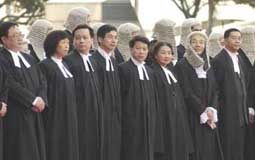
|
| Justice row: Secretary for Justice Elsie Leung (fifth from left) and other judges attend the Ceremonial Opening of the Legal Year 2003 at Bauhinia Square. |
At the Opening Ceremony of the Legal Year, the Secretary for Security reiterated her wish that members of the legal profession help resolve controversial issues under Article 23 "in a rational and constructive manner".
Elsie Leung reminded her audience that "within a few weeks, a report on the result of the public consultation exercise will be published and, in February, we hope that draft legislation will be published."
This, Ms Leung says, will give everyone "a chance to study the precise wording that is proposed and to continue to be involved in the second stage of this important project".
"I have no doubt that we all respect our constitutional obligations and are committed to safeguarding fundamental rights and freedoms. Article 23 can, and will, be implemented in a way that does not violate those rights and freedoms," she stressed.
In line with the calls in the Chief Executive's Policy Address for further integration with the Mainland, Ms Leung noted that her department has been developing links between the legal professions on the two sides of the boundary.
"I have done my best to foster such links," she said, noting that she had visited Shenzhen in April, Qingdao in July, Guangzhou in September, Chengdu in November and Chongqing in December.
"Apart from promoting the legal services provided by the practitioners of Hong Kong, I also led members of the legal profession to visit various law-related bureaux and departments with a view to their gaining a better understanding of the legal system in the Mainland."
She also helped launch a mock trial in Chongqing to show how an intellectual property case is handled under Hong Kong law.
Members of the Law Society and Bar Association will benefit from the links and exchanges that are being forged in the Pearl River Delta, Bohai Bay Economic Belt and the Western region of the Mainland, she said.
The increasing number of Hong Kong law firms that operate there reflects the growing importance of professional work in the Mainland. Currently, 38 firms have 43 representative offices there, a substantial increase from the 28 firms that existed there at the same time last year.
"My department will continue to do all it can to foster these increasing links, to help lawyers gain entry into the Mainland market, and to make Hong Kong an important legal services centre," she said.
Ms Leung also highlighted some of the legal milestones of the previous year.
A consensus has been reached on the need to expand the length of the undergraduate law degree from three to four years, and the University Grants Committee has given its approval in principle.
"Provided the two universities give their full support, the new course can begin next year," she said.
It is important that additional funding is made available not only for the extra year of undergraduate training, but also for resource-intensive teaching and assessment methods that consultants recommended.
"Unless those methods are introduced, the extra year will not achieve its purpose of producing law graduates who can compete with the best in the common law world."
Consensus has also been reached on the need for a new approach to teaching professional legal skills in the Post Certificate in Laws course, Ms Leung said.
She will introduce legislation to establish a new Standing Committee on Legal Education & Training, made up of representatives from the two branches of the profession, the two universities, other providers of legal education, and the Government, as well as lay members. It will replace the existing Advisory Committee on Legal Education.
The Justice Department has provided a "modest sum" to help start a Community Legal Services Centre's outreach programme. Lawyers give talks to interested non-governmental organisations members of the community on areas of the law that affect the man or woman in the street.
An advisory committee has recommended that two surveys be carried out - one focussing on the existing supply of legal services, and the other on the demand for such services. "By conducting the project in this way, it is hoped that any mismatch between supply and demand can be identified," Ms Leung said.
The challenges are increasing as resources are dwindling. The department must significantly reduce spending by 2006/07, meaning heavier workloads and fewer support facilities.
However, Ms Leung gave assurances that her colleagues would do everything possible to ensure that the professional services they render to the Government and, indirectly, to the community do not suffer in any way.
"With our contribution towards the pursuit of the Government's objectives and a vibrant economy, it is only a matter of time before we welcome better times," Ms Leung said.
|